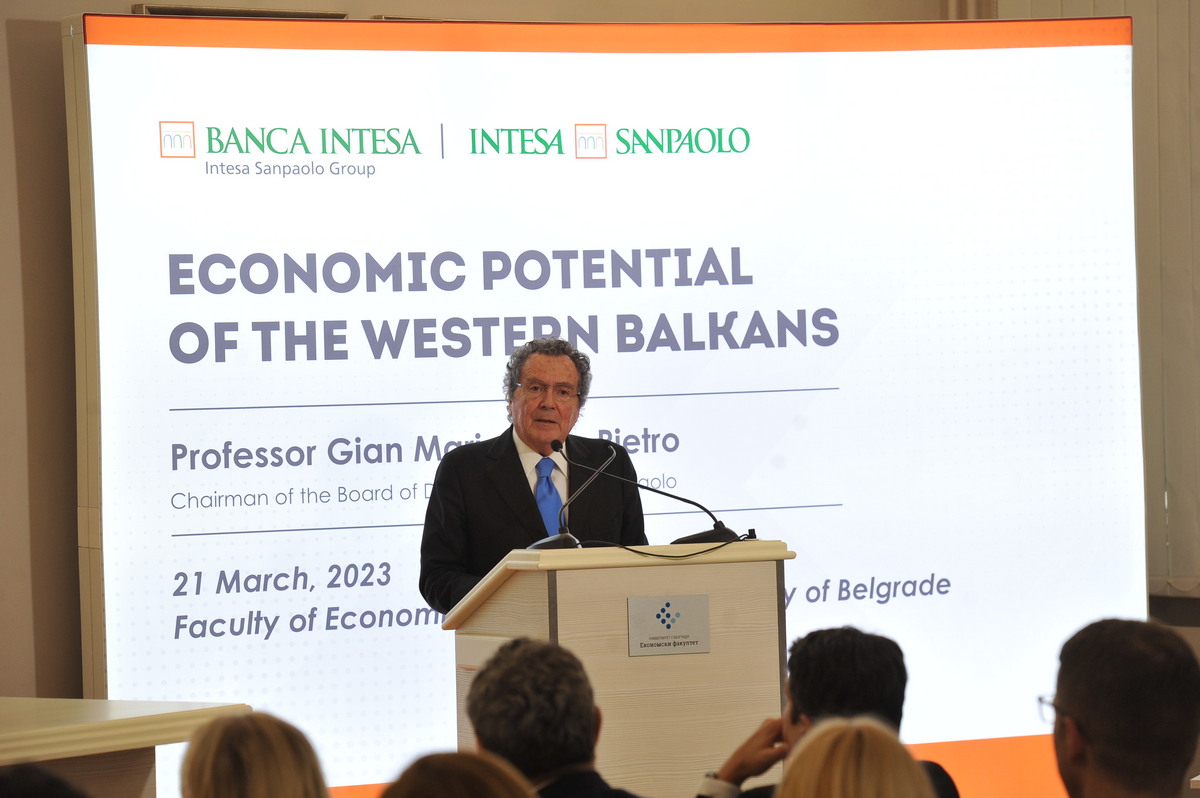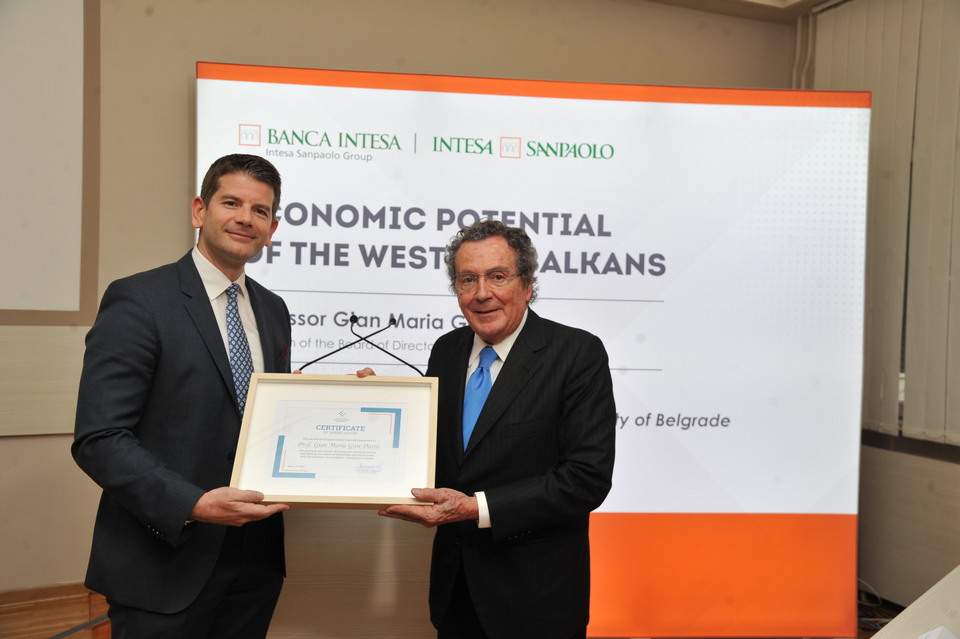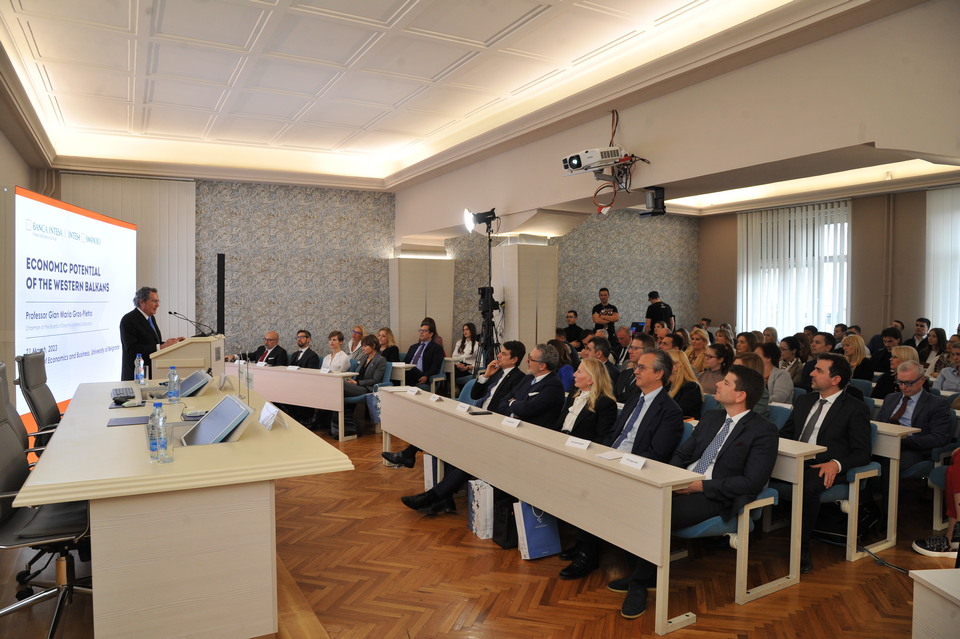Professor Gian Maria Gros-Pietro, president of the Board of Directors of the Intesa Sanpaolo Group, held a lecture in Belgrade

As a part of his visit to Belgrade visit to Belgarde, where he participated in the Serbia-Italy Business and Science Forum, Professor Gian Maria Gros-Pietro, Chairman of the Board of Directors of Intesa Sanpaolo, the international banking group within which Banca Intesa operates, held an exclusive lecture at the Faculty of Economics, the University of Belgrade on the topic “Economic potential of the Western Balkans”.
At the lecture, organized for clients and business partners of Banca Intesa and attended by professors and students of the Faculty of Economics, as well as media representatives, Professor Gros-Pietro presented his views on the current situation on the global and European banking market as well as economic perspectives of countries in the Western Balkans, with reference to the importance of further strengthening and development of the region and its potential for investments and bilateral partnerships.
Finance is still considered a powerful driving activity, while the real power is in information
Professor Gros-Pietro explained that we are currently in a historical moment when the power is shifting again. At this moment, finance is still considered a powerful driving activity, while the real power is in information.
Professor emphasized that actually, in the first months of 2023, positive elements of development were more frequent and more important than it was predicted. This year started with some good news on energy issues. The price of natural gas has fallen sharply, and future markets’ expectations indicate stability in the coming quarters. At the global level, the energy shock now looks less severe than initially expected for several reasons: Russian oil was traded at a much lower price than Brent or WTI, and there was a negative spread of about USD 30 per barrel, which means there is a sharp difference in the price of energy between Europe and USA, which is a problem for Europe. One thing is sure, and that is the future is in renewables, and finance will have to support it.

Additional good news came from removing lockdown measures in China and reopening economic activity, which should boost international trade and global GDP this and next year. Looking ahead, supply chains should be shortened for geopolitical reasons – and for Western Balkans countries, this is an important opportunity to be taken seriously.
Professor Gros-Pietro noted that cooperation with the Western Balkans and, in particular, the Republic of Serbia and Italy is a natural fact and that we are very close countries that have similar structures, and that together we can work on the part of the joint European economic policy which can be even stronger in the future.
Despite the short-term uncertainties, Professor Gros-Pietro expects a stronger economic recovery this year and in 2024, with the prediction that the economic growth of the Western Balkans will surpass the growth of Western European countries, as well as that the progress of the countries of the region towards membership in the European Union will improve their credit profiles through the strengthening of institutions, competitiveness, infrastructure and inflow of direct foreign investments.
In 2024, the prediction is that the economic growth of the Western Balkans will surpass the growth of Western European countries
When it comes to the banking sector of the region, the professor expects that despite the current movement of interest rates throughout the Western Balkans in an attempt to curb inflation, the mass of loans and deposits will continue to grow, albeit at a slower pace, with preserved portfolio quality and a low level of non-performing loans. Households’ living standards have improved as unemployment rates decreased in all countries, while wages increased to offset the real income decline due to inflation. Employment prospects are currently solid, although some challenges loom, like brain drain, which is a great risk. The only way to take this risk is to increase wages and increase the capacity of positions to pay higher salaries, so we must be prepared for this.
The last part of the lecture was dedicated to the problem of climate change. As the professor said, we tend to always pose more attention to what is urgently compared to what is important, but even if problems like pandemics, war, inflation, etc., are extremely urgent, climate change is much more important.

The European Green Agenda investments will need sophisticated financial services while accelerating the shift to green agenda means leaping from a traditional economic model to a sustainable economy in line with the European Green Deal. By signing the Sofia Declaration on the Green Agenda for the Western Balkans in November 2020, the region acknowledged the need to set the basis for a major transformation and to implement elements of the European Green Deal in all interrelated priority sectors. Additionally, Western Balkans countries have committed to implementing their actions through the Regional Action Plan adopted in Brdo in October 2021. In this 58-point Plan for the period until 2030, carbon pricing, coal phase-out plans, regional integration, pollution control, and environmental protection are the most important segments. Serbia was among the first countries in CEE to establish a Green Bond Framework and finance green-eligible projects by issuing a green bond in the international capital market, for which it also received the award „Sovereign Green Market Pioneer in 2021“, presented by the Climate Bonds Initiative.
Serbia-Italy Business and Science Forum, organized by the Serbian Chamber of Commerce, with the support of the Italian Trade Agency (ITA) and the Italian Embassy in Serbia, was dedicated to technological innovations, green energy, and energy transition, sustainable agriculture, as well as technological innovations in the agricultural sector and infrastructure, with bilateral talks between Serbian and Italian businessmen.
The participation of Professor Gros-Pietro, who was part of the official Italian delegation at the event, confirms the strong commitment of the Intesa Sanpaolo Group to Serbia and its dedication to the long-term development of its business in the Serbian market. Intesa Sanpaolo, one of the leading banking groups in Europe, employs more than 3,000 people in Serbia, providing vital support to the economic development of the country and improving the quality of life of citizens, as well as the well-being of the entire Society.